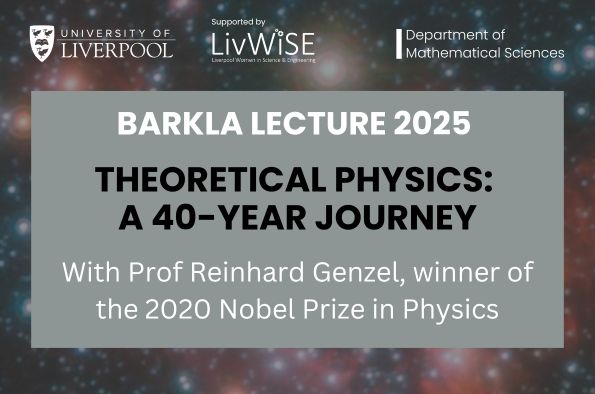
Barkla Lecture in Theoretical Physics 2025: A 40-Year Journey
- Susha Parameswaran
- Admission: FREE
- Event website
- Book now
Add this event to my calendar
Click on "Create a calendar file" and your browser will download a .ics file for this event.
Microsoft Outlook: Download the file, double-click it to open it in Outlook, then click on "Save & Close" to save it to your calendar. If that doesn't work go into Outlook, click on the File tab, then on Open & Export, then Open Calendar. Select your .ics file then click on "Save & Close".
Google Calendar: download the file, then go into your calendar. On the left where it says "Other calendars" click on the arrow icon and then click on Import calendar. Click on Browse and select the .ics file, then click on Import.
Apple Calendar: The file may open automatically with an option to save it to your calendar. If not, download the file, then you can either drag it to Calendar or import the file by going to File >Import > Import and choosing the .ics file.
The lecture will take place 5-6pm in the Lecture Theatre B of the Central Teaching Hub and will be followed by a reception 6-7pm.
It will be aimed at a general audience and undergraduate students, postgraduate students, staff, and alumni are all warmly invited to attend.
Professor Genzels's lecture and biography:
A 40-Year Journey
More than one hundred years ago, Albert Einstein published his Theory of General Relativity (GR). One year later, Karl Schwarzschild solved the GR equations for a non-rotating, spherical mass distribution; if this mass is sufficiently compact, even light cannot escape from within the so-called event horizon, and there is a mass singularity at the center. The theoretical concept of a 'black hole' was born, and was refined in the next decades by work of Penrose, Wheeler, Kerr, Hawking and many others. First indirect evidence for the existence of such black holes in our Universe came from observations of compact X-ray binaries and distant luminous quasars. I will discuss the forty year journey, which my colleagues and I have been undertaking to study the mass distribution in the Center of our Milky Way from ever more precise, long term studies of the motions of gas and stars as test particles of the space time. These studies show the existence of a four million solar mass object, which must be a single massive black hole, beyond any reasonable doubt.
Biography
Reinhard Genzel, born 1952 in Bad Homburg v. d. H., Germany, is one of the Directors of Max Planck Institute for Extraterrestrial Physics, Professor in the Graduate School of the University of California, Berkeley and an Honorary Professor at the Ludwig Maximilian University, Munich. He is a Scientific Member of the Max Planck Society and a member of the US National Academy of Sciences.
His research interests include astrophysics of galactic nuclei, star formation, kinematics and cosmic evolution of galaxies, massive black holes and experimental infrared, submillimeter and millimeter astronomy.
He has received numerous honours and awards, including the Shaw Prize of The Shaw Prize Foundation and the Crafoord Prize in Astronomy. In 2020, he received the Nobel Prize in Physics, jointly with Andrea Ghez, for the discovery of a supermassive compact object at the centre of our galaxy.
Professor Genzel is unable to travel at this time and will be joining us by zoom. Although we would love to see you in person, if needed you can also register for online attendance here:
https://tinyurl.com/barkla-lecture-2025
